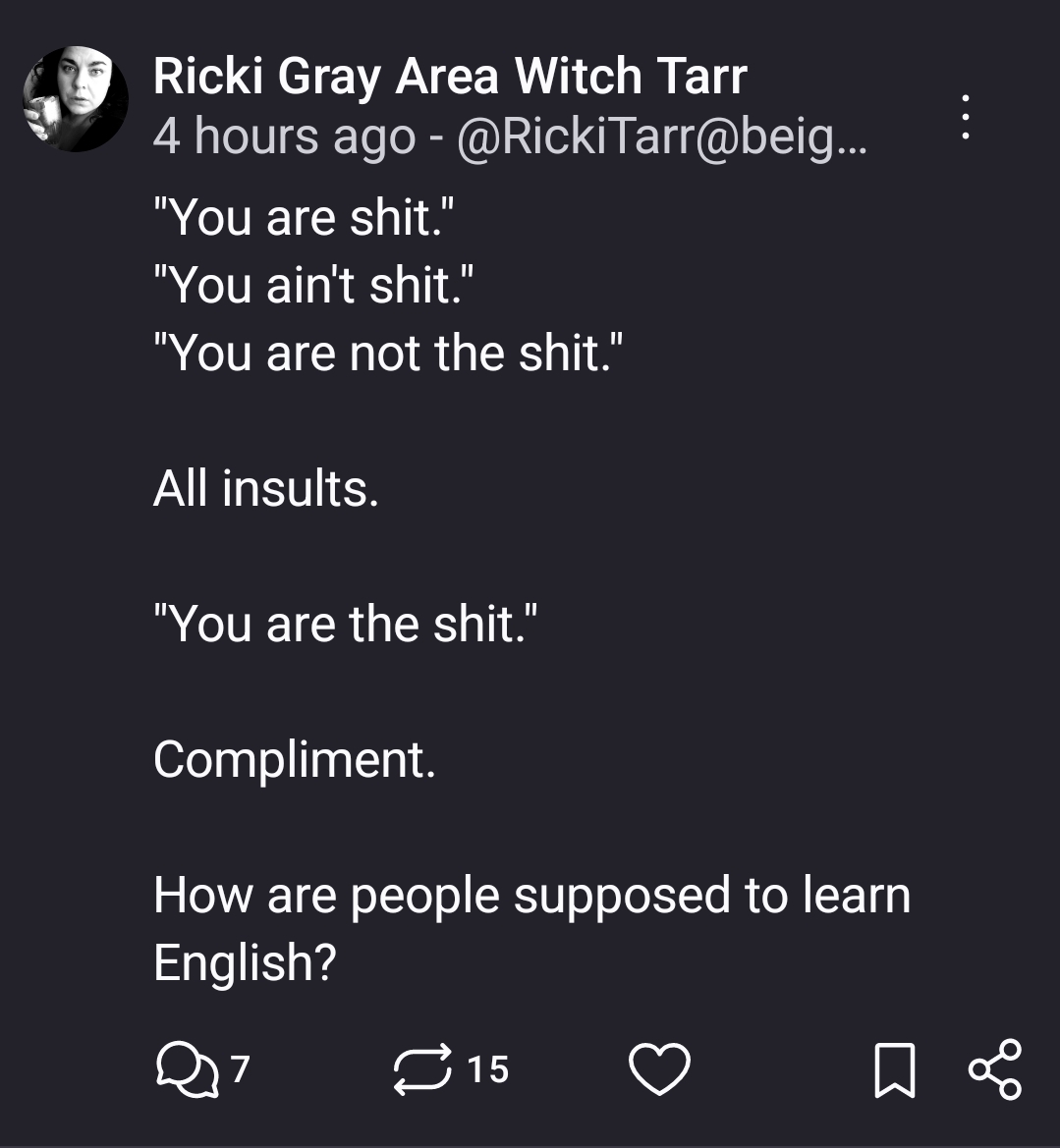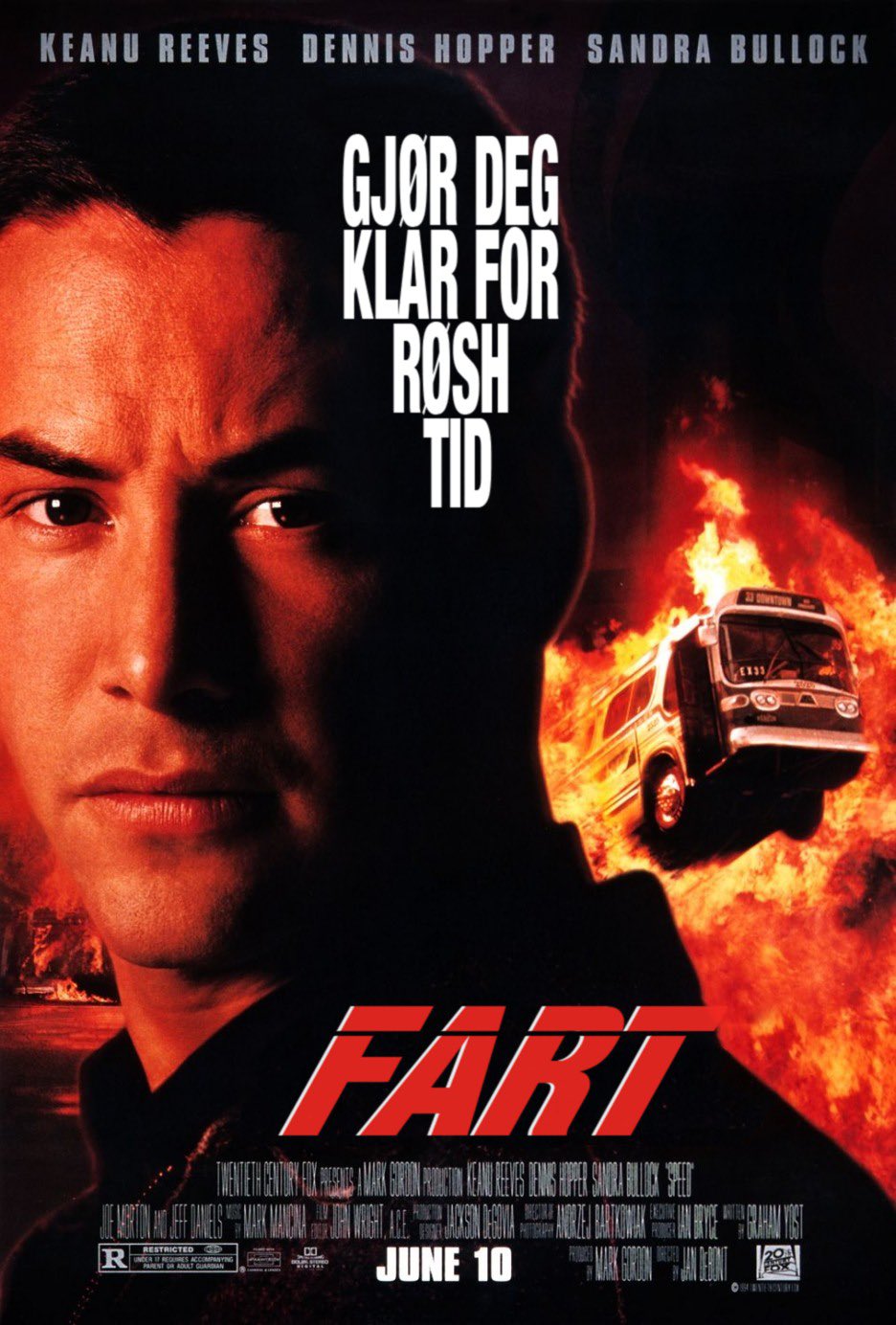Buffalo buffalo Buffalo buffalo buffalo buffalo Buffalo buffalo.
Microblog Memes
A place to share screenshots of Microblog posts, whether from Mastodon, tumblr, ~~Twitter~~ X, KBin, Threads or elsewhere.
Created as an evolution of White People Twitter and other tweet-capture subreddits.
Rules:
- Please put at least one word relevant to the post in the post title.
- Be nice.
- No advertising, brand promotion or guerilla marketing.
- Posters are encouraged to link to the toot or tweet etc in the description of posts.
Related communities:
Remind me again how this works?
https://en.wikipedia.org/wiki/Buffalo_buffalo_Buffalo_buffalo_buffalo_buffalo_Buffalo_buffalo
"Buffalo buffalo Buffalo buffalo buffalo buffalo Buffalo buffalo" is a grammatically correct sentence in English that is often presented as an example of how homonyms and homophones can be used to create complicated linguistic constructs through lexical ambiguity. It has been discussed in literature in various forms since 1967, when it appeared in Dmitri Borgmann's Beyond Language: Adventures in Word and Thought. The sentence employs three distinct meanings of the word buffalo:
- As an attributive noun (acting as an adjective) to refer to a specific place named Buffalo, such as the city of Buffalo, New York;
- As the verb to buffalo, meaning (in American English[1][2]) "to bully, harass, or intimidate" or "to baffle"; and
- As a noun to refer to the animal (either the true buffalo or the bison). The plural is also buffalo.
A semantically equivalent form preserving the original word order is: "Buffalonian bison that other Buffalonian bison bully also bully Buffalonian bison."
Abeolute legend you are, thank you!
Wow, hurt people hurt people. Even Buffalo buffalo
Buffalonian bison that other Buffalonian bison bully also bully Buffalonian bison.
The King’s English
I take it you already know
Of tough and bough and cough and dough?
Others may stumble, but not you,
On hiccough, thorough, slough and through.
Beware of heard, a dreadful word, That looks like beard but sounds like bird.
And dead: It’s said like bed, not bead -- For goodness’ sake, don’t call it deed!
Watch out for meat and great and threat… They rhyme with suite and straight and debt.
A moth is not the moth in mother, Nor both in bother, nor broth in brother.
And here is not a match for there, Nor dear and fear for bear and pear,
And then there’s dose and rose and lose -- Just look them up -- and goose and choose.
And cork and work and card and ward, And font and front and word and sword.
And do and go, then thwart and cart, Come, come, I’ve hardly made a start!
A dreadful language? Why, sakes alive! I’d learned to speak it when I was five.
And yet, to write it, the more I tried, I hadn’t learned it at fifty-five
Not sure if that's the name of the poem. It's been (mis)attributed to a T.S. Watt, called "English". A similar poem is The Chaos by Gerard Nolst Trenité, here read by Youtuber Lindybeige.
shit - adjective, bad
the shit - noun, good
.
you are shit - shit is an adjective, you are bad
you ain't shit - shit still functions as an adjective, in some contexts this might be a good thing, but the phrase "you ain't ____" most often is used to say the person doesn't reach the level of the blank. For example "you ain't all that" means you think/act like you are "all that" but you're not at the level of "all that" you're less than all that. If you "ain't shit" it means you're so bad that you're less than shit, you dont even reach the level of shit with how bad you are. This is a devestating insult.
you are not the shit - the shit is a noun, its good, so not being the shit is insulting
you are the shit - the shit is a noun meaning good so this is a complement
"We're in the shit now" - the shit, noun, bad
"I'm down for anything" and "I'm up for anything" mean the same thing.
So do "based on" and "based off" now. I can't figure where "based off" came from or why we need it. A base has always been something you put things on. Things sit ON a base. They're based ON it. Don't get me started. Ok, too late... sorry.
Based off OF. they took parts off of the base and put them in their stock script about a love triangle.
Disagree, to me 'down' implies youre open to chill events (i.e. sitting down) whereas 'up' youre open to more active events. But thats me.
I don't think that's a universally recognized distinction, but the more you use it that way and spread it around it could be one day soon.
Language is weird.
Clearly by getting their shit together
Reminds me of a funny performance about the topic by a commedian named ISMO. He does a lot of things with the English language.
is this really about learning the English language, or is this about learning insular colloquialisms and slang? you never stop learning slang, even natives....
Right this is a pretty awful example of English as a language. Like if I talk to a skibidi brainrot kid today I'd hear all sorts of shit I wouldn't understand at all like:
"Bruh I literally I need to get on my sigma grindset and start mewing so I can looks max and pull that shmlawg gyatt with the rizzle. Then I can stop gooning like a beta sussy imposter. Bet she won't fanum tax my bussin' glizzy or there'll be a whole bunch of turbulence and I'd literally hit the griddy on her. Only in ohio tho. Skibidi!"
I wouldn't really say that means I don't understand English as a language. Just that people are weird as hell with slang.
I've learned a little bit of two other languages (Spanish and Japanese) and I'm pretty confident that most languages have a ton of nuance like this that you will never understand until you are actually totally immersed in that language and culture.
I mean, everything I learned in Spanish and Japanese is all super formal. Nobody actually talks that way IRL. There's words that from a translator or dictionary mean one thing, but are colloquially used totally differently. Like calling testicles eggs or nuts. "Chupa mi heuvos." They're not saying to suck their literal eggs.
I know less Japanese than Spanish but I already notice that, like, "no" isn't ever annunciated the way I'm being taught. Instead of "iie" I'll often hear just "ya." It teaches to end every statement with "desu," but I have never heard a sentence end with a desu or desu ka in any Japanese media (which is more than just anime). It's all way more casual. Questions are still understood to be questions if you use the right inflection; no need for extra syllables.
Spanish:
"Me cago en la leche" I shit on the milk -> something bad happened, and I'm angry.
"Eres la leche" You are the milk -> you are great.
Damn, in English we can say one "shit the bed," but I might need to adapt this Spanish phrase and start saying I shit the milk.
Learning slang, in which words aren't meant literally, is pure memorization and no more difficult in one language than another.
I mean German isn't any easier: Umfahren means to run over someone And Umfahren means to drive around something
Easy, don't learn no shit vocab.
No shit.
I feel like "Tonality" is a big part of it.
Simple - one must strive not simply to be A shit but to be THE shit - The plutonic ideal of shit, the perfect shit from which all other shits are derivitive. Anything less is a failure. So following this logic.
"You ain't shit" = You are invalid from the rubric, so below par as not to be mentionable.
"You are shit" = Acknowledgement that you are shit of average or middling status but with the implications that vast improvement is nessisary because you are still a failure.
"You are not the shit" = More directed pointed reminder that you are far below the goal of being THE shit and maybe are overestimating yourself.
Learn? They're all shit at it.
~~English~~ American Culture.
The structure of those sentences are very straightforward. The cultural zeitgeist that caused that one iteration to become positive in meaning is just random chance.
Like nested replies on Reddit that all say the same thing. All of them are being upvoted, except one of them is randomly being downvoted into oblivion.
i'd still take this over the ett/en thing in swedish. basically, "ett" and "en" both mean "a" if they come before the word, and "the" if they get smashed onto the end of a word. (e.g., "ett apotek" means "a pharmacy", but "apoteket" means "the pharmacy"; "en hund" means "a dog", but "hunden" means "the dog".)
but despite "ett" and "en" meaning the same thing, they aren't interchangeable. some words are "ett" words, while others are "en" words, and you just have to remember which ones are which.
to further complicate things, there are some words that can end with "et" or "en", but each ending means something different. this typically happens with "ett" words using "en" for the plural forms of the word. for example, "barn" means "child", "ett barn" means "a child", "barnet" means "the child", but "barnen" means "the children". (it's worth also mentioning that "barn" means either "child" or "children", depending on the context.)
Lots of languages have gendered nouns, though. Three genders isn't uncommon in European languages and in most cases you just have to learn the nouns with their genders.
Itt: monolinguist native english speakers who thinks a completely common concept is exclusive to english.
Very, very slowly.
shit and fuck are the most versatile words
Fuck that shit.
Police police police police police police.
Buffalo buffalo Buffalo buffalo buffalo buffalo Buffalo buffalo.
I've known of this supposed sentence and still can't parse whatever the fuck is connecting the two groups of bullying animals who are both from the upstate NY city.
By going back to the late 90s and watching Cartoon Network, duuh.
Not joking, this is how I passively learned it Courage, Muttley,KND those were the shit.
Raises hand. "Son of beetch."
They generally leave the shitty bits to more advanced learners.
This post is bad shit.


